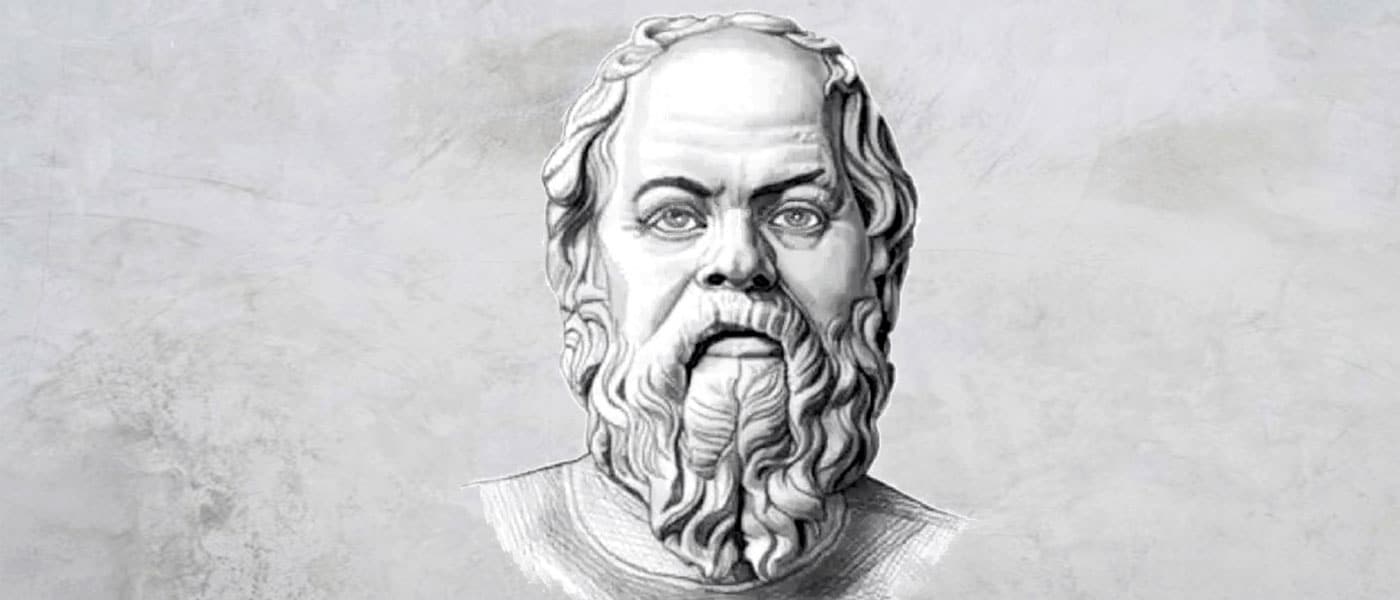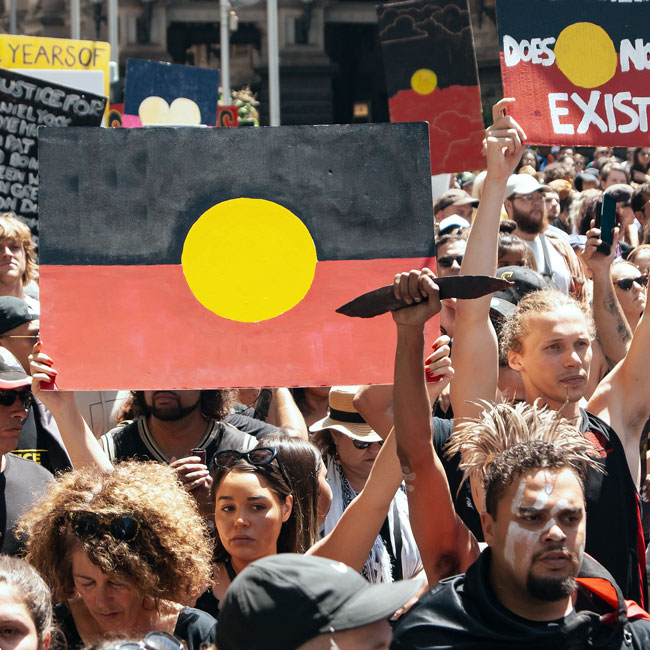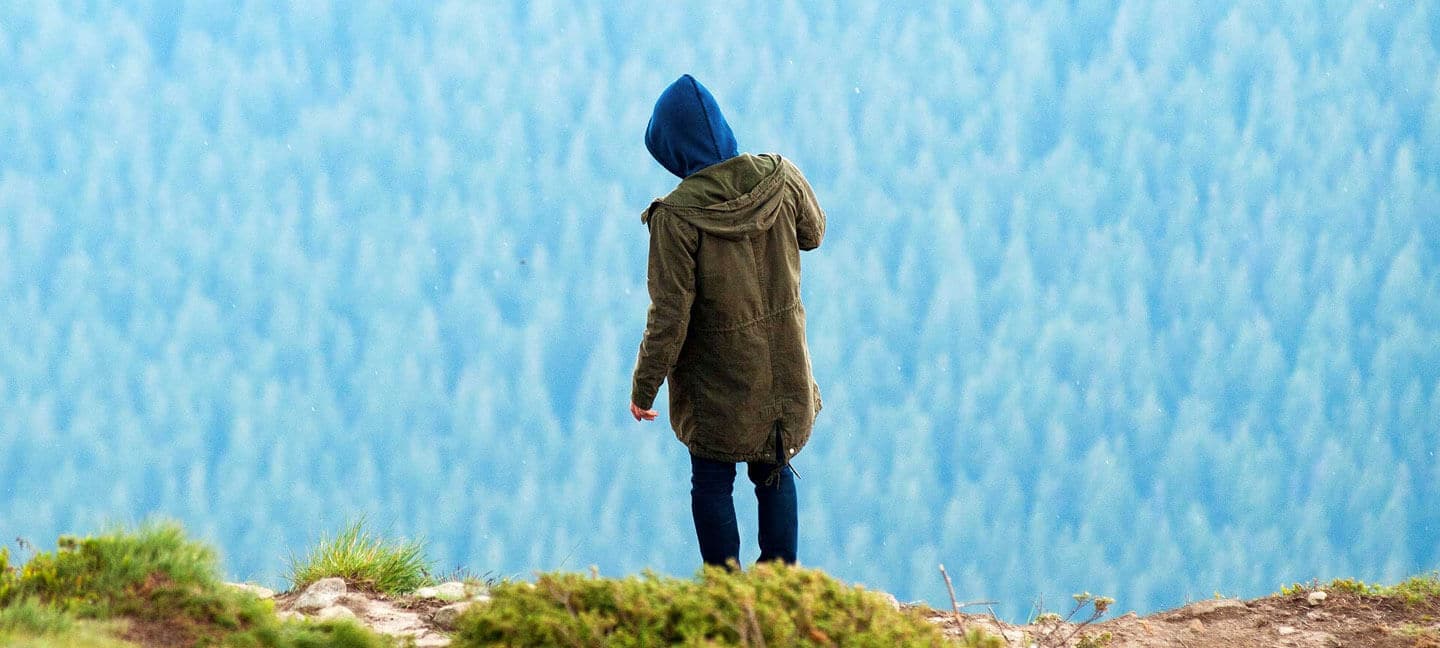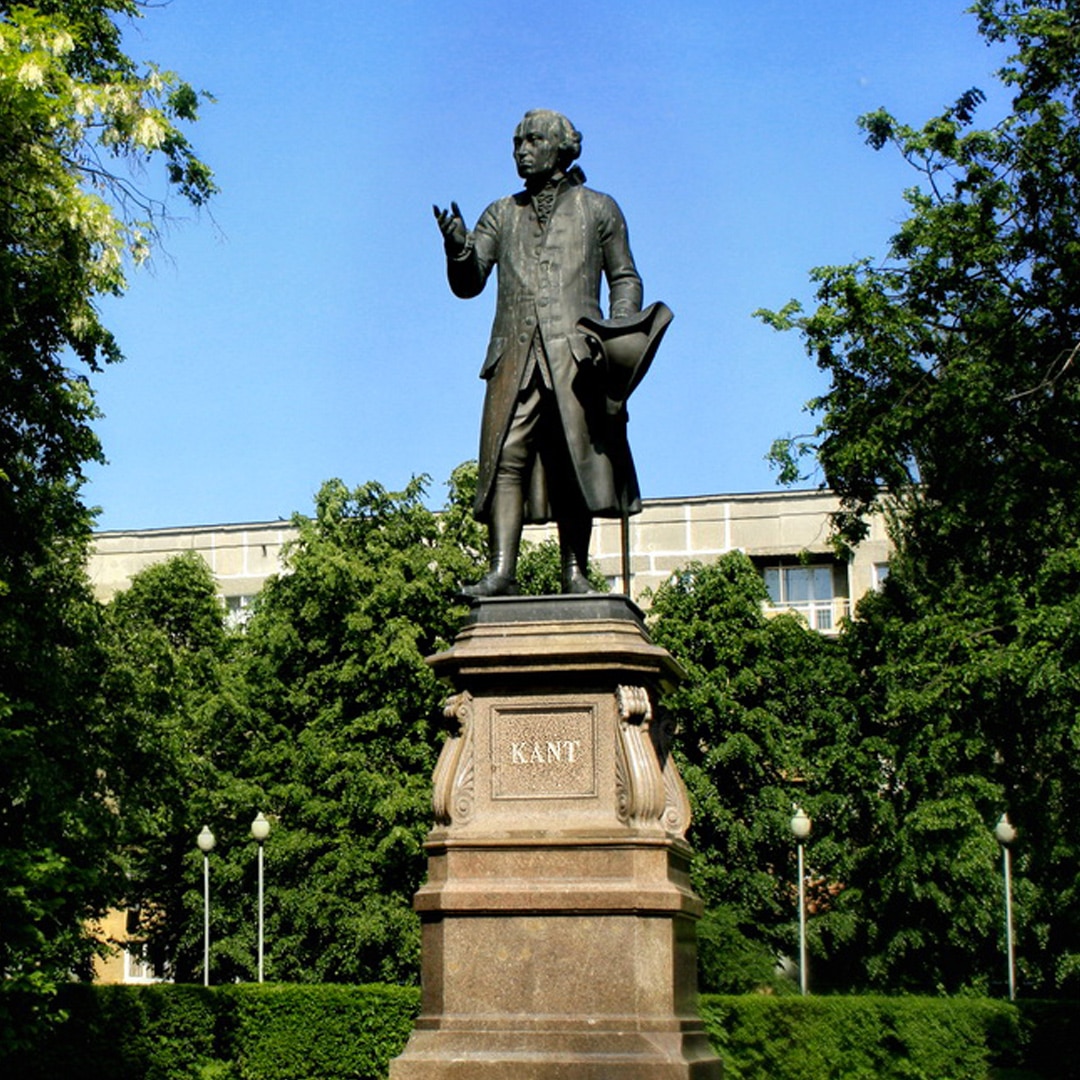The future does not just happen. It is made. And we are its authors.

The future does not just happen. It is made. And we are its authors.
Opinion + AnalysisBusiness + LeadershipRelationships
BY Simon Longstaff 5 JUN 2023
Of late, I have been thinking about how to describe the impact of the work done by The Ethics Centre. It’s a surprisingly difficult thing to do because our greatest impact typically lies in our influence on what does NOT happen.
For example, when we assist or inspire a person to step back from making a disastrous decision, there is nothing to measure. We can measure the cost of disasters. We can measure the impact of the response to disasters. However, how do we measure the impact of a disaster averted?
Let’s consider this in a wider context. My abiding sense of today’s world is that we remain on the cusp of epoch-defining change. The sense of what is before us has led me back to binge-reading vast swathes of science fiction – and the worlds I encounter there are recognisably connected to our own. Yet, the unbounded power of the authors’ imagination invites the reader to be equally bold in contemplating ‘what might be’. Wondering about ‘what might be’ leads us to the realisation that we are each responsible, at least in part, for the future that actually emerges.
The future does not just happen. It is made. And we are its authors.
And that is why ethics matters. It is humanity’s best tool for the avoidance of disastrously bad decisions – and the nightmare worlds that emerge from them. More optimistically, ethics equips us to make brilliantly good decisions – and the wonderous possibilities that they entail.
We can see this at work in one topical example; the rise and rise of CHATGPT – the most famous of a growing suite of expert systems that already have the capacity to transform our lives. Predictably, there has been a slew of prophecies about the likelihood of both utopian and dystopian futures. The emergence of new technology is always accompanied by excessively optimistic and pessimistic views about its likely effects.
Less predictably, some of the architects of this technology have urged caution. Their call for a measure of self-restraint is not grounded in fear. They simply argue that it is irresponsible to unleash a powerful, transformative force without understanding what we do. In essence, we need to set the ethical parameters within which AI should be developed and deployed. If we get this right, then sound ethics will inform policy and practice that averts all manner of mischief. Yet, the impact of ethical restraint will go unmeasured. Despite this, The Ethics Centre remains actively engaged in work to support the development of ‘responsible AI’ – as evidenced by our joining the Responsible AI Network (RAIN) being led by the CSIRO.
The Centre’s work is aligned to three strategic priorities. First, we seek to exemplify and support good decision making. Second, we work to maintain an open civic space within which the issues facing our society can be discussed – even when there is much room for disagreement. Finally, we seek to strengthen the ‘ethical infrastructure’ of our society – so that they become trustworthy to the extent that the community will rely on its key institutions to exercise good judgement in the public interest. This is especially important to any society that faces major change. For example, the transition from fossil fuels to renewable energy raises the spectre that some communities (typically linked to older forms of power generation) will bear a disproportionate share of the burdens, while others reap the benefits. If we cannot trust our governments, businesses, regulators, or other institutions to get the balance right, then reform will be slowed or halted – to the detriment of all.
The economic cost of broken ‘ethical infrastructure’ is immense. As Deloitte Access Economics has estimated, a mere ten percent increase in ethics would, by itself, generate an additional $45 Billion dollars per annum in improved GDP. Even more remarkable is that this economic return could be generated, over time, with a one-off investment of only $30 Million in funds. It’s hard to think of a better return on investment. Yet, it remains elusive.
What Australia needs is a truly national institution to help the nation lean into the challenges we face. It needs to become a trusted source of advice for governments and other key decision makers. It needs to build the capacity of our nation’s leaders, in the public and private sectors, to make good decisions – across the board. It needs to support our institutions in their efforts to regain public trust. Only then, will the community allow itself to accept the fundamental reforms that will be necessary to make the most of the future.
The establishment of such an institution will be especially important in its implications for the generations of younger Australians who so readily embrace ethics – in a way that surpasses earlier generations who looked to organised religion for guidance. That is why the Centre is investing in a new youth strategy to engage, at an early stage, with the ethical leaders of the future.
The immediate effects of a significant investment in ethics will be impossible to see. The increase in prosperity will inevitably be attributed to the wisdom of those in power. What will remain invisible are the many acts of folly that sound ethics will have prevented.
That is our conundrum. It is also why we are so deeply grateful for the support provided to us by the individuals, foundations and organisations who support our work. The Ethics Centre begins every financial year without a cent of income ‘locked in’. Nobody ‘needs’ ethics … until they do. So, we remain vulnerable. But, perhaps, that might be one of our greatest strengths – because it keeps the Centre attuned to the fundamental needs of society. Irrelevance is not an option.
So, next time things go better than expected, spare a thought for the possibility that it was the invisible hand of ethics (and not the market) that produced the result. With luck – and the generous support of our donors – we can strengthen that hand for a better future.
With your support, The Ethics Centre can continue to be the leading, independent advocate for bringing ethics to the centre of everyday life in Australia. Click here to make a tax deductible donation today.
Ethics in your inbox.
Get the latest inspiration, intelligence, events & more.
By signing up you agree to our privacy policy
You might be interested in…
Opinion + Analysis
Business + Leadership, Health + Wellbeing, Relationships
Office flings and firings
Big thinker
Relationships, Society + Culture
Big Thinker: Socrates
Opinion + Analysis
Relationships, Society + Culture
Community is hard, isolation is harder
Opinion + Analysis
Business + Leadership, Relationships
There are ethical ways to live with the thrill of gambling
BY Simon Longstaff
After studying law in Sydney and teaching in Tasmania, Simon pursued postgraduate studies in philosophy as a Member of Magdalene College, Cambridge. In 1991, Simon commenced his work as the first Executive Director of The Ethics Centre. In 2013, he was made an officer of the Order of Australia (AO) for “distinguished service to the community through the promotion of ethical standards in governance and business, to improving corporate responsibility, and to philosophy.”
The Constitution is incomplete. So let’s finish the job
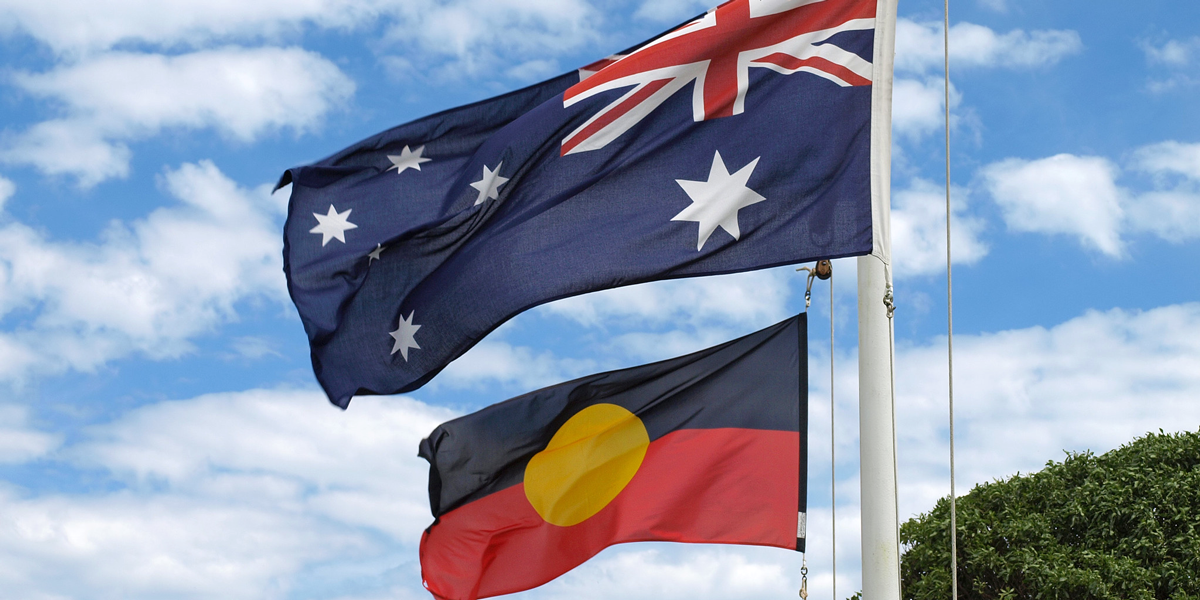
The Constitution is incomplete. So let’s finish the job
Opinion + AnalysisPolitics + Human Rights
BY Simon Longstaff 17 FEB 2023
On July 9, 1900, Royal Assent was given to the Commonwealth of Australia Constitution Act 1900. This act made provision for a series of sovereign colonial states to come together and form “one indissoluble federal commonwealth”. Section 6 of the act defines the states. It lists by name an initial seven colonies – and allows for others to be admitted at a later time.
“Hang on,” you might object, “everyone knows that there were, and are, only six states. What’s this nonsense about there being a seventh?”
Well, the framers of the Constitution wanted to recognise all of the smaller sovereign states that might make up the larger whole. So, the list included New Zealand. Indeed, when in 1902 the Commonwealth Parliament determined who could vote in federal elections, it singled out New Zealand’s Maori people for inclusion – while excluding the vast majority of Australia’s own Indigenous peoples.
This is breathtaking.
If you are wondering what any of this has to do with the proposed referendum about the Voice to Parliament, then consider this.
Those who put together the Constitution never finished the job. They left out those with the greatest claim to sovereignty of all.
Now we have the chance to finish the job – to make our Constitution whole.
We are on the cusp of resolving one of the most profound questions we face as citizens: will we afford constitutional recognition to the descendants of those First Nations peoples whose sovereignty was ignored by the European colonists?
A number of arguments have been put forward as reasons to oppose constitutional recognition of First Nations peoples in the form of a Voice to Parliament. Those arguments include that a Voice:
- Weakens First Nations’ claims to sovereignty.
- Will not lead to a tangible improvement in the lives of Indigenous peoples.
- Is “racist” and undemocratic in that it affords a privilege to one “race” over all others.
- Will increase legal uncertainty – especially when interpreting the Constitution.
In every case, framing the debate in terms of sovereignty helps us to see why these objections, while sincerely made, are not well founded.
It is feared, by some, that constitutional recognition will weaken the claims to sovereignty made by First Nations peoples. However, the Australian Constitution specifically preserves the sovereignty of each of the states that were recognised at Federation. Furthermore, all of their state laws remain intact. The only effect of the Constitution is to render state laws inoperative to the extent that they are inconsistent with valid Commonwealth legislation. Rather than destroying sovereignty, the Constitution recognises and preserves it – even as earlier laws become attenuated.
It might be objected that the First Nations of pre-colonial Australia were not “sovereign states”. However, they meet all of the accepted criteria. They may have been small – but size of territory or population does not matter (think of Monaco, Liechtenstein, Tuvalu and so on – all states). The First Nations had clearly defined borders. They had distinct laws – and processes for their enforcement. They traded – domestically and internationally (for example, centuries of trade between the Makassan people of modern Indonesia and the Anindilyakwa people of the Groote Eylandt archipelago, and others). They fought wars over people and resources and to defend their territory. All of this was anticipated by British law and policy. It was only blind ignorance and prejudice that stopped the colonists recognising the sophisticated array of states they encountered here.
A second objection is that constitutional recognition will do little or nothing to “close the gap”. Surely, Indigenous peoples have a far better idea of what is needed to address the enduring legacies of colonisation than do the rest of us. Certainly, they could not do a worse job than we have so far. So, I believe a Voice to Parliament will make a positive difference in the material circumstances of First Nations peoples. However, while important, this misses the point.
Imagine someone heading out into remote Queensland in 1899 – to tell the people living there that remaining as a crown colony might lead to better outcomes in the future. There would have been a riot in response to the suggestion that Queensland should be left a colony while the rest of the colonial states formed a federation. Even the West Australians decided to join – not because Federation guaranteed a better outcome for the people of each state, but because of the dignity it conferred on citizens of the newly established nation. It’s the same for those forgotten or ignored when the first round of Constitutional crafting was done.
The next “bad” argument claims that the creation of a Voice confers a benefit on one group of people because of their “race” – and that to do so is racist and undemocratic. Once again, the argument fails to take account of First Nations peoples as members of sovereign states. Those states existed – certainly in Natural Law (and probably more formally) for centuries prior to colonisation. The citizens of those states were exclusively Indigenous – not as a matter of racial policy but as a simple fact of history. The same would have been true of other ancient states in other parts of the world which, at one time or another, would have been made up of groups of people related through kinship and so on.
So, if we see our late recognition of the peoples of the First Nations through the lens of sovereignty and citizenship, there is necessarily going to be overlap between that citizenship and membership of a distinct group of related people.
This is not about privileging one “race” over another. It is simply acknowledging the fact that the citizens of the First Nations that we hope to recognise are all bound by a kinship grounded in deep history.
Finally, we come to the argument that an amendment to the Constitution will cause legal uncertainty – with the High Court spending wasted hours in interpreting the new provisions of an amended Constitution. If this is a valid reason for not amending the Constitution, then it is better that we should not have had a Constitution at all. Every clause in the Constitution of 1900 is open to interpretation by the High Court. Indeed, the High Court has spent a vast amount of time interpreting provisions (especially concerning the valid powers of the commonwealth). So, yes, an amendment might lead to disputes in the Federal and High Court. So what? That happens every day in relation to sections of the Constitution that are more or less taken for granted.
Finally, I am happy to see a decreasing number of people are arguing that the voice will be a “third chamber” of parliament. It will not. The Voice will be able to make representations and to advise – using whatever mechanisms the Commonwealth Parliament prescribes. The Voice will decide nothing on its own. It cannot veto any act of parliament or decision of government.
First Nations peoples have asked for something very modest. They want to be recognised. They simply want to be heard in relation to matters that have a direct bearing on their lives.
Our Constitution is a pretty good document. However, its authors left something out. While recognising the sovereignty of all others (even Fiji was in the mix for a while), they overlooked those with the best claim of all.
Imagine a fence made without a gate, a car without brakes and a cake without icing. They’ll work well enough. But they’re not complete. That’s the deficiency in our Constitution – it also works well enough, but it is not complete.
Let’s recognise what was forgotten. Let’s finish the job.
This article was first published in The Australian.
For everything you need to know about the Voice to Parliament visit here.
Ethics in your inbox.
Get the latest inspiration, intelligence, events & more.
By signing up you agree to our privacy policy
You might be interested in…
Opinion + Analysis
Politics + Human Rights
Is every billionaire a policy failure?
Big thinker
Politics + Human Rights, Relationships
Big Thinker: Dennis Altman
Opinion + Analysis
Politics + Human Rights, Relationships
We’re being too hard on hypocrites and it’s causing us to lose out
Opinion + Analysis
Business + Leadership, Politics + Human Rights
Should corporate Australia have a voice?
BY Simon Longstaff
After studying law in Sydney and teaching in Tasmania, Simon pursued postgraduate studies in philosophy as a Member of Magdalene College, Cambridge. In 1991, Simon commenced his work as the first Executive Director of The Ethics Centre. In 2013, he was made an officer of the Order of Australia (AO) for “distinguished service to the community through the promotion of ethical standards in governance and business, to improving corporate responsibility, and to philosophy.”
There are ethical ways to live with the thrill of gambling

There are ethical ways to live with the thrill of gambling
Opinion + AnalysisBusiness + LeadershipRelationships
BY Simon Longstaff 8 FEB 2023
The fun of betting on uncertain outcomes is not a problem. But addiction, organised crime and ubiquity make excessive gaming a social ill that needs a policy fix.
Debate about the regulation of gambling has intensified to the point where the sound and fury from all sides risks obscuring the central issues that must be addressed. With that in mind, I would like to offer a perspective on how the issue appears when viewed through the lens of ethics – rather than commerce or politics.
The essence of gambling is to take on risk in anticipation of a hoped for (but uncertain) reward. In that sense, pedestrians “gamble” when they try to save time by dodging through traffic rather than walking to a designated crossing. The same goes for those who make an “educated guess” when investing in equities. Like the punter who puts down a “prudent bet” – based on studying the form, visiting the track and so on – an active investor who takes into account “the fundamentals” is gambling.
However, not all forms of gambling are equal. Some are built around systems of probability that are consciously tuned so as to enable “the house” to win more than their customers lose over time. So long as everyone knows this, there is nothing problematic about this form of gambling. It’s perfectly acceptable to choose to spend money on entertainment.
So, if the practice of gambling is so innocuous, why all the fuss?
The answer is to be found in three forms of harm that, although external to the practice of gambling, have become intimately connected to it: addiction, organised crime and ubiquity.
First, the most serious harms caused by gambling are to individuals who become addicted to it. However, it is essential that we note that the “evil” is addiction – not gambling as such. Addiction to work or sex or chocolate is all deeply problematic for those who are afflicted. However, that does not make work, sex or chocolate intrinsically harmful.
Unfortunately, some parts of the gambling industry seek to exploit the addictive tendencies of some people. There are wicked individuals and organisations who seek out means to “hook” people on their gaming product. They do this through conscious design of machines, experiences, incentives … almost anything. There is no “accident” in this. The trap is deliberately set and snares whoever it can catch.
At the lower level of complicity are those who do not design to capture the addict – but rather fail to take adequate steps to protect them from harm.
Let’s avoid ‘wowserism’ of a kind that presents gambling as the problem. It is not.
It is perfectly acceptable to design for fun, excitement, or enjoyment. However, people in the gambling industry have a particular obligation to use all effective means to minimise the risk of harm to those who are susceptible to addiction. Failing to do so leads to tragic outcomes – and there is no way people in the industry can wash their hands of blame for what might reasonably have been prevented, if only a sincere effort had been made to do so. Instead, some try to block reforms, simply to advance their commercial interests.
Second, as law-enforcement agencies have highlighted – again and again – organised crime has got its hooks into the gaming industry. Criminals see their “regulated losses” as an acceptable cost to bear for the convenience of being able to “launder” vast amounts of cash through gambling.
Once again, the “evil” of organised crime is not intrinsic to the practice of gambling. Crime is pernicious wherever it rears its ugly head. It is simply an unfortunate fact of history that, for selfish reasons, criminals have developed a close association with the gaming industry. However, there is nothing necessary about that connection – which can and should be severed.
Finally, there is the problem of “ubiquity”. One of my earliest published articles on this topic noted that while there is nothing intrinsically wrong with, say, church choirs, it would be unspeakably destructive of the common good to place one on every street corner. You can have too much of even the best things (not sure that church choirs count).
Gambling is everwhere! This is especially so now that the “gambling bug” lives inside our phones and other communication devices. I have seen the banking records of a person who, having been driven to an insane level of addiction, lost all the money awarded in a workers’ compensation payment by placing one bet … every six seconds.
The fact that a gaming company allowed this to happen is disgusting. It is almost as bad that we saturate our world with advertising that pretends this is never anything more than “a bit of fun with one’s friends”.
What does all of this mean for the current debate? First, let’s avoid “wowserism” of a kind that presents gambling as the problem. It is not.
However, if we wish to enjoy the fun of ethical gaming we must choose the means, as a society, to eliminate (or at least ameliorate) the evils of addiction, organised crime and ubiquity.
Despite claims to the contrary, the technology required for cashless gaming is already developed. It should be used with default daily betting limits that apply across all forms of gaming – on the track, in casinos, in clubs, online … wherever. And while we’re at it – can we regulate gambling advertising so that it does not invade every aspect of our lives … especially not those of children who are at risk of being convinced that betting on sport is better than playing it.
Some people doubt it is possible to run profitable gaming enterprises without exploiting the deadly trio of addiction, organised crime and ubiquity. I do not agree. Difficult? Yes. Impossible? No. Given that gambling can be a source of innocent joy, I think the effort is worth it.
This article was first published in The Australian Financial Review.
Disclosure: The Ethics Centre works with individuals and organisations committed to improving the ethical dimension of their business, including companies that either directly or incidentally have a connection with gambling.
Ethics in your inbox.
Get the latest inspiration, intelligence, events & more.
By signing up you agree to our privacy policy
You might be interested in…
Opinion + Analysis
Health + Wellbeing, Relationships
Should parents tell kids the truth about Santa?
Explainer
Relationships
Ethics Explainer: Scepticism
Explainer
Relationships
Ethics Explainer: Conservatism
Opinion + Analysis
Relationships, Society + Culture
Meet Daniel, helping us take ethics to the next generation
BY Simon Longstaff
After studying law in Sydney and teaching in Tasmania, Simon pursued postgraduate studies in philosophy as a Member of Magdalene College, Cambridge. In 1991, Simon commenced his work as the first Executive Director of The Ethics Centre. In 2013, he was made an officer of the Order of Australia (AO) for “distinguished service to the community through the promotion of ethical standards in governance and business, to improving corporate responsibility, and to philosophy.”
When are secrets best kept?

Throughout the ages, people subject to the torments of even the most oppressive regimes have found solace in the fact that even when their bodies are controlled, their minds can remain free.
People have the capacity to hold information and beliefs that cannot be discerned by any mind other than their own. Of course, in many cases (but not all) the mental reserves needed to preserve a secret can be destroyed by those who employ torture. However, only the most vicious and desperate resort to such despicable acts – and even then, they can never be sure that what they are told is actually true. But that is another topic for another time.
For now, I want to highlight the remarkable strength of secrets – a strength conferred by their retention in regions of the human mind that are inaccessible to others.
The fact that we cannot ‘read minds’ allows each of us a particular kind of freedom.
However, it would be a lonely existence if we were not also endowed with the capacity to share our thinking with others through all of the forms of communication available to us – physical, verbal, literal, and symbolic. So, for the most part, we liberally share our thoughts, feelings and beliefs in word and deed – while retaining some things entirely to ourselves.
While this is the context in which secrets exist, it’s important to note the distinction between ‘having’ and ‘holding’ secrets. In the first case, secrets can be our own – something that we know we choose not to disclose to others. In the second case, secrets can ‘belong’ to someone else who has shared them with us – on the condition we preserve the secrecy of what has been disclosed.
There are many examples of both kinds of secret. For example, a person may have suffered some kind of sexual assault in their youth but, for a range of reasons, may never disclose this to another soul. It will be their secret – and they will take it to the grave. Alternatively, if they share this secret with another person – on the condition that no other person ever know this truth – then the latter person will have agreed to hold the secret for as long as required to do so by the person whose secret has been shared with them.
It’s easy to see in this example just some of the problems with secrets. Let’s suppose that the person who abused the youth is still at large – possibly still offending. Does the person who ‘holds’ the secret have an obligation to prevent harm that is greater than the obligation to protect their friend’s secret? One might hope that the friend would agree to reveal the identity of the malefactor. However, what if they refuse? What if a person at risk of abuse asks a direct question about the person whom you know to be a threat to them? Are you required to lie or to dissemble in order to keep the secret?
Of course, the ability to have and to hold secrets can also enable great evil. For example, some secrets can obscure damaging, false beliefs that – even if sincerely held – present grave risks to individuals or whole communities. We can see such ‘secret knowledge’ at work in certain cults and conspiracy theories. Because secret, these sometimes deadly false beliefs cannot be challenged or amended by exposure to the ‘sunlight’ of open enquiry and debate. Deadly secrets can fester and grow in the dark to the point where they can poison whole sections of the community.
What’s more, perverse forms of secrecy can be employed by powerful interests as a tool to control others. Whole regimes have been propped up by ‘secret police’, the cloaking of wrongdoing behind the veil of ‘official secrets’, and so on.
The ethics of secrets have a practical bearing on matters affecting individuals, groups and whole societies. Core questions include: Is there a distinction between a ‘confidence’ and a ‘secret’? Do certain people have a right to know information that others wish to keep secret? Are we ever obliged to disclose another person’s secret? What, if anything, is a ‘legitimate secret’? Who decides questions of legitimacy? How does one balance the interests of individuals and society?
Join Dr Simon Longstaff on Thur 23 Nov as he lifts the lid on secrets and their role in living an ethical life. The Ethics of Secrets tickets on sale now.
Ethics in your inbox.
Get the latest inspiration, intelligence, events & more.
By signing up you agree to our privacy policy
You might be interested in…
WATCH
Relationships
How to have moral courage and moral imagination
Opinion + Analysis
Relationships
The philosophy of Virginia Woolf
Opinion + Analysis
Climate + Environment, Relationships, Science + Technology
From NEG to Finkel and the Paris Accord – what’s what in the energy debate
Opinion + Analysis
Health + Wellbeing, Relationships
There is something very revealing about #ToiletPaperGate
BY Simon Longstaff
After studying law in Sydney and teaching in Tasmania, Simon pursued postgraduate studies in philosophy as a Member of Magdalene College, Cambridge. In 1991, Simon commenced his work as the first Executive Director of The Ethics Centre. In 2013, he was made an officer of the Order of Australia (AO) for “distinguished service to the community through the promotion of ethical standards in governance and business, to improving corporate responsibility, and to philosophy.”
We are on the cusp of a brilliant future, only if we choose to embrace it

We are on the cusp of a brilliant future, only if we choose to embrace it
Opinion + AnalysisBusiness + LeadershipPolitics + Human Rights
BY Simon Longstaff 22 JUN 2022
Speaking a couple of days after the 2022 Federal Election, renowned Australian journalist, Stan Grant, noted that although the election of the Albanese government had been a moment of national ‘catharsis’, it was more difficult to discern in the result a commitment to a clear, positive direction for the nation. In that sense, the future shape of Australia remained an ‘open question’.
This was not to deny that the Australian electorate seemed to express, through their vote, a few clear preferences: an end to the debilitating ‘climate wars’, higher standards of integrity in federal politics and more generally, a preference for a more diverse and inclusive form of representation in our national parliament and government.
There is every reason to believe that these expectations will be met. Indeed, one might be encouraged to hope for something more. For example, it was remarkable that the first utterance of Prime Minister Albanese, on claiming victory, was to promise a referendum to enshrine in the Constitution an Indigenous ‘Voice to Parliament’ as called for in the Uluru Statement From The Heart. The surprise in this was that this issue had barely been mentioned during the election campaign – yet had clearly loomed large in the mind of the new PM.
So, what else might we aim to achieve as a democratic nation endowed with the most fortuitous circumstances of any nation on earth? Yes, despite the current ‘doom and gloom’, we are on the cusp of a truly brilliant future – if only we choose to embrace it.
We have everything any society could need: vast natural resources, abundant clean energy and an unrivalled repository of wisdom held in trust by the world’s oldest continuous culture supplemented by a richly diverse people drawn from every corner of the planet. However, whether this future can be grasped depends not on our natural resources, our financial capital, or our technical nous. The ultimate determinant lies in our character.
Three forces can shatter our path to prosperity. First, enemies from without who seek to exploit our grievances and divide our nation into warring factions. Second, a collective fear of the unknown and a lack of trust in those who would lead us there. Third, a lingering, persistent doubt about the legitimacy of a society that violently dispossessed the first peoples of our continent.
Each of these threats can be neutralised – if only we have the collective will and the courage to do so. With this in mind, I have outlined below a set of core, national objectives that I think would secure the endorsement of a vast majority of Australians. It is the realisation of these objectives that will unlock the brilliant future that is available to all Australians.
In five years, we can fashion a society that is at ease with itself and its place in the world. We can have sown the seeds out of which will grow a universal sense of belonging – a gift bestowed by First Nations people who have only ever asked for respect, truth and justice. That sense of unfettered connection, informed by an Indigenous understanding of country that has grown over time immemorial, will be the glue that binds us into one people of many parts. Once established and reinforced, nothing will dissolve that bond.
In five years, we can grow the confidence to embrace radical change – confident that no individual or group will be asked to bear a disproportionate burden while others take an unfair share of the gains. Our commitment to a broadly egalitarian society will move from myth to reality. While we may not all rise to equal heights, no one will be left to fall into the depths of neglect or obscurity. This will allow us to be brave, to take risks and to harvest the rewards of doing so.
In five years, we can be better led. Confidence can be restored in our governments – that they will truly honour their democratic obligation to act solely in the public interest – whether in their use of public resources or in the policies and practices they adopt.
In five years, the aged, the sick and infirm should be cared for by a workforce who are properly valued and rewarded for their support of the most vulnerable.
In five years, all Australians should have a genuine opportunity to make a home for themselves in affordable, secure accommodation.
In five years, everyone should feel more safe and secure in their homes, their workplaces, their cities and towns.
In five years, a confident Australia can build and reinforce enduring alliances with nations who share our desire to live in a just and orderly world free from the heavy yoke of authoritarian governments.
All of this is possible. For the most part our physical and technical infrastructure is world class. Our ethical infrastructure could be better. We need to invest in this area – confident that in doing so we will unlock both social and economic benefits of staggering proportions. As Deloitte Access Economics has estimated, a mere 10% increase in the level of ethics in Australia would lead to an increase in GDP of $45B (yes, billion) every year – not through some kind of ‘magical effect’ but as a direct consequence of the increased trust that better ethics would create.
Do this and we can embrace the brilliant future that beckons us.
With your support, The Ethics Centre can continue to be the leading, independent advocate for bringing ethics to the centre of life in Australia. Click here to make a tax deductible donation today.
Ethics in your inbox.
Get the latest inspiration, intelligence, events & more.
By signing up you agree to our privacy policy
You might be interested in…
Big thinker
Health + Wellbeing, Politics + Human Rights, Relationships
Big Thinker: Judith Butler
Reports
Business + Leadership
Trust, Legitimacy & the Ethical Foundations of the Market Economy
Opinion + Analysis
Business + Leadership, Relationships
There are ethical ways to live with the thrill of gambling
Opinion + Analysis
Climate + Environment, Politics + Human Rights
Are we idolising youth? Recommended reads
BY Simon Longstaff
After studying law in Sydney and teaching in Tasmania, Simon pursued postgraduate studies in philosophy as a Member of Magdalene College, Cambridge. In 1991, Simon commenced his work as the first Executive Director of The Ethics Centre. In 2013, he was made an officer of the Order of Australia (AO) for “distinguished service to the community through the promotion of ethical standards in governance and business, to improving corporate responsibility, and to philosophy.”
Ukraine hacktivism

Ukraine hacktivism
Opinion + AnalysisPolitics + Human RightsScience + Technology
BY Simon Longstaff 2 MAR 2022
As reported by David Crowe in the Sydney Morning Herald, Ukraine’s Foreign Minister, Dmytro Kuleba, has recently called on individuals, from other countries, to join the fight against Russia’s invasion.
“Foreigners willing to defend Ukraine and world order as part of the International Legion of Territorial Defence of Ukraine, I invite you to contact foreign diplomatic missions of Ukraine”, he said on Sunday night.
It is important to note that it is illegal for Australians to take up this call. As things stand, Australians commit a criminal office if they fight for any formation other than properly constituted national armed forces. This prohibition was introduced to deter and punish Australians hoping to fight in the ranks of ISIS. However, it applies far more generally. As such, it proscribes an age-old practice of individuals engaging in warfare in support of causes they wish to champion. Unlike mercenaries (who will fight for whichever side will pay them the better price), there have been people, throughout history, willing to risk their lives and limbs for idealistic reasons.
More recent examples include those who joined the International Brigade to fight Fascist forces in Spain during the early part of the Twentieth Century, those who joined the Kurds to oppose ISIS, in recent years, and also those who fought with and for ISIS in order to establish a Caliphate in the Middle East.
It should be noted that the choices mentioned above are not morally equivalent – even though the underlying motivation is, essentially, the same. Those who opposed Fascism in the 1930s did not employ terrorism as a principal tactic. ISIS did – unrestrained by any of the ethical limitations arising out of the Just war tradition.
That tradition was developed to deal with forms of war which took place in real time and across real battlespaces where combatants and non-combatants could be killed by a direct encounter with a lethal weapon or its effects.
In recent days, this discussion has taken on a new character as volunteer ‘hacktivists’ have taken up virtual arms, on Ukraine’s behalf, in a cyber-war against Russian forces. Once again, there are non-Ukrainian nationals engaged in a conflict that pits them against an aggressor – not for financial reward, not for reasons of self-preservation but simply because they feel compelled to defend an ideal. Of course, there are bound to be some amongst their ranks who are just in it for the mischief. However, I think most will be sincere in their conviction that they are doing some good.
That said, there is some truth to the old adage that ‘the road to hell is paved with good intentions’. It is not enough to be realising a noble purpose. One also needs to employ legitimate means. It is this thought that lies behind the observation, by Canadian philosopher Michael Ignatieff, that the difference between a ‘warrior’ and a ‘barbarian’ lies in ethical restraint.
In an ideal world, those who belong to the profession of arms are trained to apply ethical restraint in their use of force. The allegations levelled against a few members of the SAS, in Afghanistan, indicate that there can be a gap between the ideal and the actual. However, in the vast majority of cases, Australia’s professional shoulders serve as ‘warriors’ rather than ‘barbarians’.
But what of the ethical restraint required of volunteer cyber-warriors? There are some general observations, as outlined by Dr Matt Beard and I in our publication Ethical By Design: Principles for Good Technology. Our first principle is that ‘CAN does NOT imply OUGHT’. That is, the mere fact that you can do something does not mean that you should!. However, I think that some of the traditional ethical restraints derived from ‘just war theory’ should also apply.
There are three principles of particular importance. First, you need to be satisfied that you are pursuing a just cause. Self-defence and the defence of others who have been attacked without just cause have always been allowed – with one proviso … your own use of force must be directed at securing a peace that is superior to that which would have prevailed if no force had been used.
That accounts for the ends that one might pursue. When it comes to the means, they need to accord with the principles of ‘discrimination’ and proportionality’. The first says that you may only attack a legitimate target (a combatant, military infrastructure, etc.). The second requires you only to use the minimal amount of force needed to achieve one’s legitimate ends.
President Putin’s forces have violated all three principles of just war. He has invaded another nation without just cause. He is targeting non-combatants (innocent women and children) and he is employing weaponry (and threatening an escalation) that is entirely disproportionate.
The fact that he does so does not justify others to do the same.
Volunteer cyber-warriors have to be extremely careful that in their zeal to harm Putin and his armed forces, they do not deliberately (or even inadvertently) harm innocent Russians who have been sucked into one man’s war.
Of course, this means fighting with the equivalent of ‘one arm tied behind the back’. The temptation is to fight ‘fire with fire’ – but that only leads to the loss of one of one’s ‘moral authority’. The hard lessons of history have taught us that this is a potent weapon in itself.
The law might not prevent a cyber-warrior from fighting on the side of Ukraine from a desk somewhere in Australia. However, one should at least pause to consider the ethical dimension of what you propose to do and how you propose to go about it.
There can be honour in being a cyber-warrior. There is none in being a cyber-barbarian.
Ethics in your inbox.
Get the latest inspiration, intelligence, events & more.
By signing up you agree to our privacy policy
You might be interested in…
Opinion + Analysis
Politics + Human Rights
Antisocial media: Should we be judging the private lives of politicians?
Opinion + Analysis
Politics + Human Rights
If politicians can’t call out corruption, the virus has infected the entire body politic
Opinion + Analysis
Science + Technology, Society + Culture
AI is not the real enemy of artists
Opinion + Analysis
Science + Technology
The Ethics of In Vitro Fertilization (IVF)
BY Simon Longstaff
After studying law in Sydney and teaching in Tasmania, Simon pursued postgraduate studies in philosophy as a Member of Magdalene College, Cambridge. In 1991, Simon commenced his work as the first Executive Director of The Ethics Centre. In 2013, he was made an officer of the Order of Australia (AO) for “distinguished service to the community through the promotion of ethical standards in governance and business, to improving corporate responsibility, and to philosophy.”
The tyranny of righteous indignation

“It would be better to live under robber barons than under omnipotent moral busybodies. The robber baron’s cruelty may sometimes sleep, his cupidity may at some point be satiated; but those who torment us for our own good will torment us without end for they do so with the approval of their own conscience. They may be more likely to go to Heaven yet at the same time likelier to make a Hell of earth.”
I have been reflecting on this quotation from C.S. Lewis. It seems to contain a warning for our time, when people are inclined to gorge themselves on the nectar of “righteous indignation”. Intoxicated with the sensation of apparent virtue, the “righteous” then set upon anyone who falls beyond their moral pale.
Indignation has no natural political or ideological home. It can be found in equal measure among so-called “progressives” and “conservatives”. Each group has its own ranks of “shock troops” ready to do the most terrible things in the firm belief that they are justified by the rightness of their cause. They are like the sans-culottes of the French Revolution or the Nazi “Brown Shirts” of the last century — convinced that callous indifference should rule the fate of those whom they bully until their targets either retreat or break. Any sense of common decency, based in a recognition of a common humanity, is dissolved in the acid of resentment.
Fortunately, in Australia, righteous indignation rarely gives rise to violence on the streets. Instead, it is enacted, for the most part, in an online environment made all the more vicious by the fact that one can cause harm at a distance (and often cloaked in anonymity) without ever having to confront the awful reality of what is done.
My colleague, Tim Dean, has written about the ethics of outrage, which touches on a number of the matters that I point to above. My intention, here, is to look at a particular philosophical problem with righteous indignation — namely, its tendency to destroy (rather than express) a capacity for virtue. This is not simply a matter of philosophical interest.
The implications of this argument also have practical implications, especially for those who are truly committed to changing the world for the better.
In my experience, most of those who ultimately embrace the excesses of righteous indignation start from an entirely reasonable and defensible position. This is typically grounded in some form of ethical insight — usually relating to a genuine instance of wrong-doing, often involving the oppression of one group of people by another. For example, the ancien régime swept away by the French Revolution was corrupt. The Black Lives Matter (BLM) movement begins with a true insight that some lives (black lives) are being discounted as if they do not matter either at all or as much as the lives of others. Which is to say, BLM is based on valuing all lives. And so it is with most movements: they begin with a genuine and justifiable grievance, which risks being converted into something far less subtle and far more dangerous.
Robespierre undermined the integrity of the French Revolution by harnessing “The Terror” in service of his ideal — the creation of a “Republic of Virtue”. He unleashed the mob to ravage those who differed from them even to the slightest degree of privilege. To be “privileged” was to be doomed — as Robespierre himself discovered when the mob eventually turned on him and despatched him to the guillotine.
Unfortunately, every movement has its “Robespierres”. They amplify the general sense of there being a wrong that needs to be righted. They exploit the sentiments of those with a sincere desire to do good in the world. They fashion an “index of commitment” where you are judged by the extremity of your action — the more extreme, the more committed you are shown to be. Excess of zeal becomes a badge of merit, a token of sincerity.
So, what might this have to do with I’ve called the destruction of virtue? The answer lies in the implications of “excess”. For Aristotle, the phrōnimos (the person of practical wisdom, or phrōnēsis) attains virtue when they rid themselves of the distorting lenses of vice so as to see (and act according to) the “golden mean” — a point between two vicious extremes. For example, the virtue of courage lies between the poles of “reckless indifference to the risk of harm” at one end and “hiding away from danger” at the other. That is, a courageous person has a clear appreciation of danger and takes a measured decision to overcome their fear and stand fast all the same.
Righteous indignation disavows the golden mean. Instead, it creates a counterfeit version of virtue in which the extreme is presented as the ideal.
This distortion leads otherwise good people, with good motives, in the service of a good cause, to do abominable things.
Worse still, those who act abominably are encouraged to think that their conduct is excused because done “in good conscience”. Yet another counterfeit.
It is easy enough to justify all manner of wrongdoing by an appeal to “conscience”. That is why one of the greatest exponents of conscience, St. Thomas Aquinas, insisted that we are only bound to act in conformance with a “well-informed conscience” — and as my friend Father Frank Brennan, SJ, would add, a “well-formed conscience”.
I think it sad to see so many people being sucked into a world of “righteous indignation” that has little, if any, relationship to a conscientious life of virtue. People of virtue exercise ethical restraint. They are not wantonly cruel. They do not index the intrinsic dignity of persons according to the colour of their skin, their culture and beliefs, their sex and gender or their socio-economic status. They know that “two wrongs do not make a right”.
Instead of tormenting others for their own good — and, perhaps, for the good of the world — the virtuous will seek to engage and persuade, exemplifying (rather than subverting) the ideals they seek to promote. If ever there is to be a “Republic of Virtue”, it will have no place for the righteously indignant.
This article originally appeared on ABC Religion & Ethics.
Ethics in your inbox.
Get the latest inspiration, intelligence, events & more.
By signing up you agree to our privacy policy
You might be interested in…
Opinion + Analysis
Relationships
Stopping domestic violence means rethinking masculinity
Explainer
Relationships
Ethics Explainer: Respect
Big thinker
Relationships
Big Thinker: Jean-Paul Sartre
Opinion + Analysis
Relationships, Society + Culture
If we’re going to build a better world, we need a better kind of ethics
BY Simon Longstaff
After studying law in Sydney and teaching in Tasmania, Simon pursued postgraduate studies in philosophy as a Member of Magdalene College, Cambridge. In 1991, Simon commenced his work as the first Executive Director of The Ethics Centre. In 2013, he was made an officer of the Order of Australia (AO) for “distinguished service to the community through the promotion of ethical standards in governance and business, to improving corporate responsibility, and to philosophy.”
How can we travel more ethically?

How can we travel more ethically?
Opinion + AnalysisClimate + EnvironmentHealth + Wellbeing
BY Simon Longstaff 14 DEC 2021
I used to be an inveterate traveller – so much so that I would take, on average, a minimum of two flights per week. That is no longer the case.
I have trouble recalling the last time I was on an aeroplane. That will change this week, when I board a flight for Tasmania – my third attempt, in two years, to join family there. So, is this the beginning of a return to a life of endless travel – both at home and abroad? Or will a trip to the airport continue to be a relatively rare experience?
Of course, such questions apply to all modes of transport – whether they be by road, rail, air or sea. Perhaps we have become conditioned to think that the answers lie in the hands of public health officials and government ministers who, between them, can stop us in our tracks.
However, every journey begins with us – with a personal decision to travel. So, what should we take into account when making such a decision?
Perhaps one of the most important considerations is to do with who bears the burden of our decision. A 2018 article published in Nature Climate Change estimated that tourism contributes to 8% of the world’s climate emissions, with those emissions likely to grow at the rate of 4% per annum. Of these emissions, 49% were attributable to transport alone. And this was just tourism.
One also needs to add to this the emissions of people, like me, largely travelling for reasons of work rather than leisure. One of the effects of the current global pandemic has been to reduce, to a massive degree, the level of emissions caused by travel. This is welcome news to those most likely to be affected by predicted changes caused by anthropogenic warming – notably those living on low-lying islands and others whose lives (and livelihoods) are at risk of devastating harm.
Yet, it’s easy enough to find advertisements enticing us to travel to the very same low-lying islands whose economies rely on tourism. The paradoxes don’t end there. Another criticism of tourism is that it tends to commodify the cultures of those most visited – and in some cases does so to the point of corruption. Those who mount this criticism argue that we should value the diversity of ‘pristine’ cultures in the same way that we value pristine diversity in nature. Retaining one’s culture free from influences from the wider world is not necessarily the choice that people living within those cultures would make for themselves. Some hold fast to an unsullied form of life. Others are keen to share their experience with the world – not only as a source of income, but also out of a very human sense of curiosity and a desire to share the human experience.
To make matters even more complex, not all travel is for reasons of leisure or work. It is sometimes driven by necessity or a sense of obligation to others, such as when joining a loved one who is sick or dying, or to attend a family ceremony. Even those obliged to travel have, of late, been asked to ‘think twice’ or, in some cases, had the decision taken out of their hands due to border closures that have allowed few (if any) exemptions. And even those few exemptions tend to have been offered only to the very rich, powerful or popular.
This might seem to suggest that we should calibrate our decisions about travel according to its purpose. If one can achieve the same outcome by other means (such as using a video conference rather than meeting in person), then that should be the preferred option. However, I have discovered that this approach only gets you so far (excuse the pun). Some meetings only really work if people are in the same room – especially if the issues require nuanced judgement and there are some obligations (like those owed to a sick or dying relative) that can only be discharged in person.
Despite this, the causes of climate change or life-threatening viruses don’t have any regard for our motives for travelling. A virus can just as easily hitch a ride with a person rushing to the side of an ailing parent as a person off to relax on a beach. All other things being equal, they have the same impact on the environment.
Given this, how should we approach the ethical dimension of travel?
First, I think we need to be ‘mindful travellers’. That is, we should not simply ‘get up and go’ just because we can. We need to think about the implications of our doing so – including the unintended, adverse consequences of whatever decision we make.
Second, we should seek to minimise the unintended, adverse consequences. For example, can we choose a mode of travel that has minimal negative impact? It is this kind of question driving people to explore new forms of low-carbon transport options.
Third, can we mitigate unintended harm – for example, by purchasing offsets (for carbon) or looking to support Indigenous cultures where we might encounter them?
Finally, can we maximise the good that might be done by our travelling?
Ethics in your inbox.
Get the latest inspiration, intelligence, events & more.
By signing up you agree to our privacy policy
You might be interested in…
Big thinker
Health + Wellbeing, Politics + Human Rights, Relationships
Big Thinker: Judith Butler
Opinion + Analysis
Health + Wellbeing, Society + Culture
Does your body tell the truth? Apple Cider Vinegar and the warning cry of wellness
Opinion + Analysis
Health + Wellbeing, Politics + Human Rights
Don’t throw the birth plan out with the birth water!
Opinion + Analysis
Health + Wellbeing, Relationships
Living well or comfortably waiting to die?
BY Simon Longstaff
After studying law in Sydney and teaching in Tasmania, Simon pursued postgraduate studies in philosophy as a Member of Magdalene College, Cambridge. In 1991, Simon commenced his work as the first Executive Director of The Ethics Centre. In 2013, he was made an officer of the Order of Australia (AO) for “distinguished service to the community through the promotion of ethical standards in governance and business, to improving corporate responsibility, and to philosophy.”
COP26: The choice of our lives
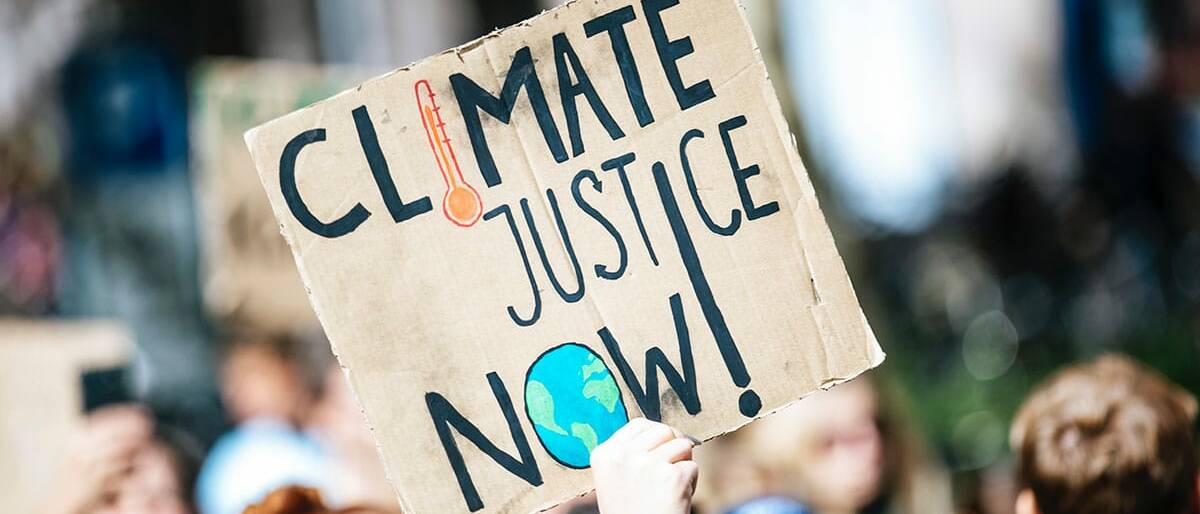
COP26: The choice of our lives
Opinion + AnalysisPolitics + Human Rights
BY Simon Longstaff 25 OCT 2021
There is such a thing as truth. It might be difficult to discern.
Aspects of the truth might vary depending on one’s perspective. However, there are some things that can be known with a certainty sufficient to guide practical action. One of those truths is that life is fragile. The more complex its form, the greater its vulnerability. In the web of life, the severing of one strand can lead the whole to unravel. Cataclysmic failure is not inevitable. It’s just possible – and that is worth knowing. Those who gamble with life take a mighty risk.
In ethics – facts matter. They really matter. Too often, they are ignored by those who think that good intentions are enough. By themselves, good intentions are not enough.
These and other matters are worth bearing in mind as a selection of the world’s leaders gather in Glasgow for COP26. The overwhelming consensus of the world’s leading climate scientists is that life-as-we-know-it is imperiled by the cumulative effects of greenhouse gases. We, humans, are the major source of those emissions. We are the most powerful force on this planet. Our choices shape and make the world what it is.
Ethics is about how these choices are made. It identifies and examines the drivers of choice and ultimately helps us to discern what is good or bad, right or wrong, in the choices we make. At its most fundamental level, ethics underpins the world we make.
So, in every respect, what happens in Glasgow is a matter of ethics.
It is also a matter of politics – and this is where the divorce between ‘ethics’ and ‘politics’ is a cause for concern. The division was never intended to be as great as it has become. For Aristotle, ‘ethics’ and ‘politics’ were intended to be two sides of the same coin. Ethics was concerned with questions about the good life for an individual. Politics was also concerned about questions to do with the good life – but as applied to the community as a whole.
In the lead up to COP26 in Glasgow, we have witnessed a very partial kind of politics that has no apparent concern for the national interest. Instead, the debate about climate change has been recast as a contest between country and city.
In prosecuting their case, the National Party has sought to remain part of the national government while simultaneously trashing the most basic obligation of governments: that they govern for the sake of all.
I should make it clear that when it comes to climate policy, the Ethics Centre has been one of the earliest and most steadfast advocates for a just and orderly transition to a more sustainable future – for everyone affected, not just those living under the National Party’s wing.
The attempt to weaken Australia’s position in Glasgow hinges on a couple of arguments. First, the claim is made that anything Australia does to reduce its contribution to global warming will be ‘futile’ – as our national impact is tiny in comparison to major polluters such as China and India. Second, it is argued that the cost to the economy is just too great to bear – especially for those working in ‘climate exposed’ industries. The National Party then adds to this critique by stating that people living in the cities are asking their country cousins to carry a disproportionate share of the burden.
History reveals what is wrong with such arguments. For example, consider the decision, by a Labor Government, unilaterally to slash tariffs and embark upon an ambitious program to promote free trade. The decision to do so was grounded in a commitment to the national interest and the reasonable belief that, in the long term, the benefits would outweigh the costs – and be shared by all. Back then (as now), Australia represented only around 3% of global trade. In that sense, slashing Australian tariffs could have been presented as a ‘futile gesture’. After all, why cut tariffs in advance of the world’s major economies? And that argument was made by those who opposed trade liberalisation at the time – the Coalition parties.
So, who are the major beneficiaries of free trade? It is the people whom the National Party claims to represent; those working in agriculture, mining and minerals. Who paid the price? Hundreds of thousands of people who lost their jobs in manufacturing – mostly in industries like textiles, clothing, footwear, automotive, etc. And where did most of these people live? In metropolitan areas. So it has been ever since. Australia’s free trade deals inevitably aim to maximise the incomes of people living in rural and regional Australia while leaving the price to be paid by people living in the cities.
Have we heard anyone from the National Party offering sympathy for those who have paid such a high price for regional prosperity? Not a word. Indeed, not a word from anyone. Why the silence? Well, you could put it down to political indifference. Or, it could be that there is now a broad consensus that despite the pain of transition (which typically has been disorderly and unjust), the national interest has been served.
Which brings us back to Glasgow.
Nearly everyone – other than the Federal Government – seems to agree that, for Australia, Glasgow presents a golden opportunity. The adoption of strong, binding targets could enable Australia to become one of the most prosperous nations the world has ever known. We have access to unlimited renewable energy, vast natural resources, a stable socio-economic environment, educated people and so on. We have everything needed to prosper. Indeed, just as it was in Australia’s national interest unilaterally to cut tariffs and embrace free trade, so it is in our national interest to embrace ambitious climate targets – not just for 2050 but by 2030. The stronger the drivers, the better the longer-term outcome.
Yet, even as I write these words, I wonder if this is to miss the point?
As noted above, Aristotle thought ‘ethics’ and ‘politics’ should concern themselves with questions about the ‘good life’. But for whom? For people in the bush? For Australians? For humanity? Or is our duty to ‘life’ itself? Is not the truth about global warming’s threat to life on this planet the ultimate ethical foundation upon which to build strong commitments in Glasgow?
When it comes to life on this planet, there is no ‘town’ and ‘country’, no ‘Coalition and ‘Labor’, no ‘Us’ and ‘Them’. We are all in this together.
I realise that politics is the ‘art of the possible’ – and that the average politician is acutely sensitive to the sentiments of their electorate. However, there are times when, at their best, politicians enlarge our possibilities and in doing so, lead their electorate to a better place. This is why politics used to be considered the most noble calling of a citizen.
Our Prime Minister, Scott Morrison, has been wrestling with a form of politics that falls well short of that ideal. It is open to him to choose something better. That is both the gift (and curse) of his humanity. In Glasgow we will see not only what kind of politician Scott Morrison can be on our behalf. We will also get the measure of his capacity to lead. But most importantly, he will reveal the character of his humanity.
Ethics in your inbox.
Get the latest inspiration, intelligence, events & more.
By signing up you agree to our privacy policy
You might be interested in…
Opinion + Analysis
Business + Leadership, Politics + Human Rights, Relationships
Tim Soutphommasane on free speech, nationalism and civil society
Explainer
Politics + Human Rights, Relationships
Ethics Explainer: Critical Race Theory
Opinion + Analysis
Politics + Human Rights, Relationships
How to have a conversation about politics without losing friends
Opinion + Analysis
Politics + Human Rights, Relationships
The Dark Side of Honour
BY Simon Longstaff
After studying law in Sydney and teaching in Tasmania, Simon pursued postgraduate studies in philosophy as a Member of Magdalene College, Cambridge. In 1991, Simon commenced his work as the first Executive Director of The Ethics Centre. In 2013, he was made an officer of the Order of Australia (AO) for “distinguished service to the community through the promotion of ethical standards in governance and business, to improving corporate responsibility, and to philosophy.”
Vaccination guidelines for businesses

Vaccination guidelines for businesses
Opinion + AnalysisBusiness + LeadershipPolitics + Human Rights
BY Simon Longstaff 14 OCT 2021
Businesses are having to address complex ethical questions about the extent to which a person’s vaccination status should be a condition of employment.
Here are some guidelines to consider:
1. There is a difference between a mandatory requirement (where there is no choice) and a condition of employment (which people can choose to meet as they think best).
Many jobs impose conditions of employment that relate to a person’s health status (including whether or not they have been vaccinated).
2. Respect and promote the maximum degree of freedom of employees – limited only by what is required to meet one’s obligations to others.
In determining this it’s important to consider:
- The nature of any duties owed to other people – including employees, customers, and members of the community more generally.
- The specific context within which people will come into contact with your employees e.g. frequency, proximity, location – and estimate the way these variables shape ‘the risk envelope’.
3. Determine if a legitimate authority (e.g. a government) has made any rules.
This includes Legislation, regulation, public health orders, etc. that determine how the business must act. For example, governments may set license conditions that ‘tie the hands’ of specific employers.
4. Actively seek alternative means by which employees might perform their roles, even if they are not vaccinated.
Note, alternatives must be practical and affordable.
5. Determine who bears the burden (including the cost) of alternative measures.
For example, should employees who choose not to be vaccinated be required to be masked, or to use rapid antigen testing at their expense?
6. Consider how roles might be reassigned amongst the unvaccinated.
With priority given to those with medical exemptions.
7. Treat every person with respect – ensuring that no person is ridiculed or marginalised because of their choice.
But note that respect for one person or group does not entail agreement with their position; nor does it void one’s obligations to others or your right, as an employer, to advance your own interests.
8. Be prepared to adjust your own position in response to changing circumstances.
Including evidence based on the latest medical research relating to vaccine safety and efficacy, etc.
Read more on the difference between compulsory and conditional requirements here.
Ethics in your inbox.
Get the latest inspiration, intelligence, events & more.
By signing up you agree to our privacy policy
You might be interested in…
Opinion + Analysis
Business + Leadership
The dangers of being overworked and stressed out
Opinion + Analysis
Business + Leadership, Relationships
Employee activism is forcing business to adapt quickly
Opinion + Analysis
Business + Leadership
A radical act of transparency
Reports
Business + Leadership



